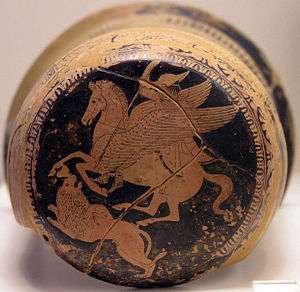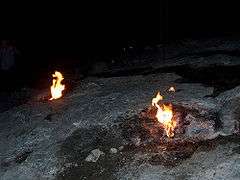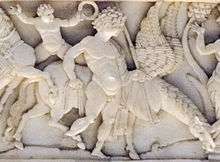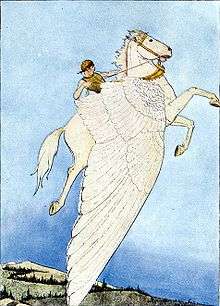Bellerophon

Bellerophon (/bəˈlɛrəfən/; Greek: Βελλεροφῶν) or Bellerophontes (Βελλεροφόντης) is a hero of Greek mythology. He was "the greatest hero and slayer of monsters, alongside Cadmus and Perseus, before the days of Heracles",[1] and his greatest feat was killing the Chimera, a monster that Homer depicted with a lion's head, a goat's body, and a serpent's tail: "her breath came out in terrible blasts of burning flame."[2] Bellerophon was born at Corinth and was the son of the mortal Eurynome by either her husband Glaucus, or Poseidon.
Etymology
One possible etymology that has been suggested is: Βελλεροφόντης from βέλεμνον, βελόνη, βέλος ("projectile, dart, javelin, needle, arrow, bullet") and -φόντης ("slayer") from φονεύω ("to slay"). However, Geoffrey Kirk says that "Βελλεροφόντης means 'slayer of Belleros'".[3] Belleros could have been a Lycian, a local daimon or a Corinthian nobleman—Bellerophon's name "clearly invited all sorts of speculation".[3]
Bellerophon's myth
The Iliad vi.155–203 contains an embedded narrative told by Bellerophon's grandson Glaucus, named for his great-grandfather, which recounts Bellerophon's myth. Bellerophon's father was Glaucus,[4] who was the king of Corinth and the son of Sisyphus. Bellerophon's grandsons Sarpedon and the younger Glaucus fought in the Trojan War. In the Epitome of pseudo-Apollodorus, a genealogy is given for Chrysaor ("of the golden sword") that would make him a double of Bellerophon; he too is called the son of Glaucus the son of Sisyphus. Chrysaor has no myth save that of his birth: from the severed neck of Medusa, who was with child by Poseidon, he and Pegasus both sprang at the moment of her death. "From this moment we hear no more of Chrysaor, the rest of the tale concerning the stallion only...[who visits the spring of Pirene] perhaps also for his brother's sake, by whom in the end he let himself be caught, the immortal horse by his mortal brother."[5]

Bellerophon's brave journey began in the familiar way,[6] with an exile: he had murdered either his brother, whose name is usually given as Deliades, or killed a shadowy "enemy", a "Belleros"[7] (though the details are never directly told), and in expiation of his crime arrived as a suppliant to Proetus, king in Tiryns, one of the Mycenaean strongholds of the Argolid. Proetus, by virtue of his kingship, cleansed Bellerophon of his crime. The wife of the king, whether named Anteia[8] or Stheneboea,[9] took a fancy to him, but when he rejected her, she accused Bellerophon of attempting to ravish her.[10] Proetus dared not satisfy his anger by killing a guest, so he sent Bellerophon to King Iobates his father-in-law, in the plain of the River Xanthus in Lycia, bearing a sealed message in a folded tablet: "Pray remove the bearer from this world: he attempted to violate my wife, your daughter."[11] Before opening the tablets, Iobates feasted with Bellerophon for nine days. On reading the tablet's message Iobates too feared the wrath of the Erinyes if he murdered a guest; so he sent Bellerophon on a mission that he deemed impossible: to kill the Chimera, living in neighboring Caria. The Chimera was a fire-breathing monster whose make-up comprised the body of a goat, the head of a lion and the tail being a serpent. This monster had terrorized the nearby countryside. On his way he encountered the famous Corinthian seer Polyeidos who gave him advice about his oncoming battle.
Capturing Pegasus


Polyeidos told Bellerophon that he would have need of Pegasus. To obtain the services of the untamed winged horse, Polyeidos told Bellerophon to sleep in the temple of Athena. While Bellerophon slept, he dreamed that Athena set a golden bridle beside him, saying "Sleepest thou, prince of the house of Aiolos? Come, take this charm for the steed and show it to the Tamer thy father as thou makest sacrifice to him of a white bull."[12] It was there when he awoke. Bellerophon had to approach Pegasus while it drank from a well; Polyeidos told him which well—the never-failing Pirene on the citadel of Corinth, the city of Bellerophon's birth. Other accounts say that Athena brought Pegasus already tamed and bridled, or that Poseidon the horse-tamer, secretly the father of Bellerophon, brought Pegasus, as Pausanias understood.[13] Bellerophon mounted his steed and flew off to where the Chimera was said to dwell.
The slaying of the Chimera
When he arrived in Lycia, the Chimera was truly ferocious, and he could not harm the monster even while riding on Pegasus. He felt the heat of the breath the Chimera expelled, and was struck with an idea. He got a large block of lead and mounted it on his spear. Then he flew head-on towards the Chimera, holding out the spear as far as he could. Before he broke off his attack, he managed to lodge the block of lead inside the Chimera's throat. The beast's fire-breath melted the lead, and blocked its air passage.[14] The Chimera suffocated, and Bellerophon returned victorious to King Iobates.[15] Iobates, on Bellerophon's return, was unwilling to credit his story. A series of daunting further quests ensued: he was sent against the warlike Solymi and then against the Amazons who fought like men, whom Bellerophon vanquished by dropping boulders from his winged horse; when he was sent against a Carian pirate, Cheirmarrhus, an ambush failed, when Bellerophon killed all sent to assassinate him; the palace guards were sent against him, but Bellerophon called upon Poseidon, who flooded the plain of Xanthus behind Bellerophon as he approached. In defense the palace women sent him and the flood in retreat by rushing from the gates with their robes lifted high, offering themselves, to which the modest hero replied by withdrawing.[16] Iobates relented, produced the letter, and allowed Bellerophon to marry his daughter Philonoe, the younger sister of Anteia, and shared with him half his kingdom,[17] with fine vineyards and grain fields. The lady Philonoe bore him Isander,[18] Hippolochus and Laodamia, who lay with Zeus the Counselor and bore Sarpedon but was slain by Artemis.[19][20][21]
Flight to Olympus and fall
As Bellerophon's fame grew, so did his hubris. Bellerophon felt that because of his victory over the Chimera, and because he thought he was a god he deserved to fly to Mount Olympus, the realm of the gods. However, this presumption angered Zeus and he sent a gadfly to sting the horse, causing Bellerophon to fall all the way back to Earth. Pegasus completed the flight to Olympus where Zeus used him as a pack horse for his thunderbolts.[22] On the Plain of Aleion ("Wandering"), Bellerophon (who had fallen into a thorn bush) lived out his life in misery as a blinded crippled hermit, grieving and shunning the haunts of men until he died.[23] In Tlos, near Fethiye, in modern-day Turkey, ancient Lykia, there is a tomb with a carving of a man riding a winged horse. This is claimed locally to be the tomb of Bellerophon.
Euripides' Bellerophontes
Enough fragments of Euripides' lost tragedy Bellerophontes remain embedded as some thirty quotations in surviving texts to give scholars a basis for assessing its theme: the tragic outcome of his attempt to storm Olympus on Pegasus. An outspoken passage—in which Bellerophon seems to doubt the gods' existence from the contrast between the wicked and impious, who live lives of ease with the privations suffered by the good—is apparently the basis for Aristophanes' imputation of "atheism" to the tragic poet.[24]
Perseus on Pegasus
The replacement of Bellerophon by the more familiar culture hero Perseus was a development of Classical times that was standardized during the Middle Ages and has been adopted by the European poets of the Renaissance and later.[25]
In popular culture
- The first planet discovered orbiting a Sun-like star, 51 Pegasi b, has been unofficially nicknamed 'Bellerophon'.[26]
- Chimera, the 1972 National Book Award-winning novel by John Barth, includes a novella called Bellerophoniad that is a complex postmodern retelling and examination of the myth of Bellerophon.
- In The Concept of Anxiety, Søren Kierkegaard wrote that Bellerophon "sat calmly on his Pegasus in the service of the idea but fell when he wanted to misuse Pegasus by riding the horse to a rendezvous with a mortal woman."[27]
- The classical opera seria Il Bellerofonte of the Czech composer Josef Mysliveček, premiered in Naples, 1767; its libretto by Giuseppe Bonecchi focused on the passion of the queen Antea.
- The French composer Jean-Baptiste Lully wrote the opera Bellérophon which premiered in Paris in 1679.
- Bellerophon is a computer program used by geneticists and molecular biologists to detect invalid "chimera" genetic sequences.
- Bellerophon was also the name of four or more Royal Navy warships, the first of which fought many naval battles against Napoleon. HMS Bellerphon’s keel was laid down in 1782, she was launched in 1792 and broken up in 1836. Napoleon surrendered and was taken aboard the Bellerophon after his defeat at Waterloo. Known as "Billy Ruffian" by the crew, the 74 gun warship fought at the Battle of the Nile (1798) and Battle of Trafalgar (1805). The second HMS Bellerophon was an early battleship, renamed Indus III in 1904 and used for training, then sold in 1922. The third HMS Bellerophon was the lead ship of a three-ship class, which were a follow up to HMS Dreadnought; she fought at the Battle of Jutland. For other ships of the same name, see HMS Bellerophon.
- The USS Bellerophon (ARL-31) was one of 41 Achelous-class landing craft repair ships built for the United States Navy during World War II. She was the only U.S. Naval vessel to bear the name.
- A large statue called Bellerophon Taming Pegasus graces the facade of the Columbia Law School in Manhattan.
- Bellerophon astride Pegasus, as the first airborne warrior, is the traditional symbol of British Airborne forces.
- Starships and planets named Bellerophon have appeared in many TV shows, films, and books, such as:
- The 1956 movie, Forbidden Planet (in which the "Monster from the Id" unleashed by Dr. Morbius is a composite of different kinds of animals, like the Chimera)
- The Andromeda episode "The Lone and Level Sands"
- The Star Trek: Deep Space Nine episode "Inter Arma Enim Silent Leges"
- The Halo: Evolutions short story The Impossible Life and Possible Death of Preston J. Cole. Later renamed the Bellicose after it was captured by insurrectionists.
- The TV series "Firefly", which features a rich inner planet with this name.
References
- ↑ Kerenyi 1959, p. 75.
- ↑ Iliad vi.155–203.
- 1 2 Kirk 1990, p. 178
- ↑ By some accounts, Bellerophon's father was really Poseidon. Kerenyi 1959 p 78 suggests that "sea-green" Glaucus is a double for Poseidon, god of the sea, who looms behind many of the elements in Bellerophon's myth, not least as the sire of Pegasus and of Chrysaor, but also as the protector of Bellerophon.
- ↑ Kerenyi 1959 p 80.
- ↑ See Joseph Campbell, The Hero with a Thousand Faces, chapter 1, "Separation".
- ↑ The suggestion, made by Kerenyi and others, makes the name "Bellerophontes" the "killer of Belleros", just as Hermes Argeiphontes is "Hermes the killer of Argus". Carpenter, Rhys (1950). "Argeiphontes: A Suggestion". American Journal of Archaeology. 54 (3): 177–183. JSTOR 500295., makes a carefully argued case for Bellerophontes as the "bane-slayer" of the "bane to mankind" in Iliad II.329, derived from a rare Greek word έλλερον, explained by the grammarians as κακόν, "evil". This έλλερον is connected by Katz, J. (1998). "How to be a Dragon in Indo-European: Hittite illuyankas and its Linguistic and Cultural Congeners in Latin, Greek, and Germanic". In Jasanoff; Melchert; Oliver. Mír Curad. Studies in Honor of Calvert Watkins. Innsbruck. pp. 317–334. ISBN 3851246675. with a Hesychius gloss ελυες "water animal", and an Indo-European word for "snake", or "dragon", cognate to English eel, also found in Hittite Illuyanka, which would make Bellerophon the dragon slayer of Indo-European myth, represented by Indra slaying Vrtra in Indo-Aryan, and by Thor slaying the Midgard Serpent in Germanic. Robert Graves in The Greek Myths rev. ed. 1960 suggested a translation "bearing darts".
- ↑ In Iliad vi.
- ↑ Euripides' tragedies Stheneboia and Bellerophontes are lost.
- ↑ This mytheme is most familiar in the narrative of Joseph and Potiphar's wife. Robert Graves also notes the parallel in the Egyptian Tale of Two Brothers and in the desire of Athamas' wife for Phrixus (Graves 1960, 70.2, 75.1).
- ↑ The tablets "on which he had traced a number of devices with a deadly meaning" constitute the only apparent reference to writing in the Iliad. Such a letter is termed a "bellerophontic" letter; one such figures in a subplot of Shakespeare's Hamlet, bringing offstage death to Rosencrantz and Guildenstern. Such a letter figures in the earlier story of Sargon of Akkad.
- ↑ Kerenyi 1959, quoting Apollodorus Mythographus, 2.7.4.
- ↑ Description of Greece1.4.6.
- ↑ Some of the red-figure pottery painters show Bellerophon wielding Poseidon's trident instead (Kerenyi 1959).
- ↑ Hesiod, Theogony 319ff; Bibliotheke, ii.3.2; Pindar, Olympian Odes, xiii.63ff; Pausanias, ii.4.1; Hyginus, Fabulae, 157; John Tzetzes, On Lycophron.
- ↑ Robert Graves, 75.d; Plutarch, On the Virtues of Women.
- ↑ The inheritance of kingship through the king's daughter, with many heroic instances, was discussed by Finkelberg, Margalit (1991). "Royal succession in heroic Greece". The Classical Quarterly. New Series. 41 (2): 303–316. doi:10.1017/s0009838800004481. JSTOR 638900.; compare Orion and Merope.
- ↑ Isander was struck down by Ares in battle with the Solymi (Iliad xvi.
- ↑ Homer, Iliad, 6. 197–205
- ↑ Oxford Classical Mythology Online. "Chapter 25: Myths of Local Heroes and Heroines". Classical Mythology, Seventh Edition. Oxford University Press USA. Archived from the original on July 15, 2011. Retrieved April 26, 2010.
- ↑ Diodorus Siculus, refers to her as Deidamia and makes her wife of Evander, son of Sarpedon the elder and by her father of Sarpedon the younger. Library of History, 5. 79. 3
- ↑ Parallels are in the myths of Icarus and Phaeton.
- ↑ Pindar, Olympian Odes, xiii.87–90, and Isthmian Odes, vii.44; Bibliotheke ii.3.2; Homer, Iliad vi.155–203 and xvi.328; Ovid, Metamorphoses ix.646.
- ↑ Riedweg, Christoph (1990). "The 'atheistic' fragment from Euripides' Bellerophontes (286 N²)". Illinois Classical Studies. 15 (1): 39–53. ISSN 0363-1923.
- ↑ Johnston, George Burke (1955). "Jonson's 'Perseus upon Pegasus'". The Review of English Studies. New Series. 6 (21): 65–67. doi:10.1093/res/VI.21.65.
- ↑ "Stars with Exoplanets". 2010-11-11.
- ↑ The Concept of Anxiety. Princeton University Press. 1980. p. 150. ISBN 0-691-02011-6.
Further reading
- Graves, Robert, 1960. The Greek Myths, revised edition (Harmondsworth: Penguin)
- Homer, Iliad, book vi.155–203
- Kerenyi, Karl, 1959. The Heroes of the Greeks (London: Thames and Hudson)
- Kirk, G. S., 1990. The Iliad: A Commentary Volume II: books 5-8. (Cambridge: Cambridge University Press)
External links
-
 Media related to Bellerophon at Wikimedia Commons
Media related to Bellerophon at Wikimedia Commons - Images of Bellerophon in the Warburg Institute Iconographic Database